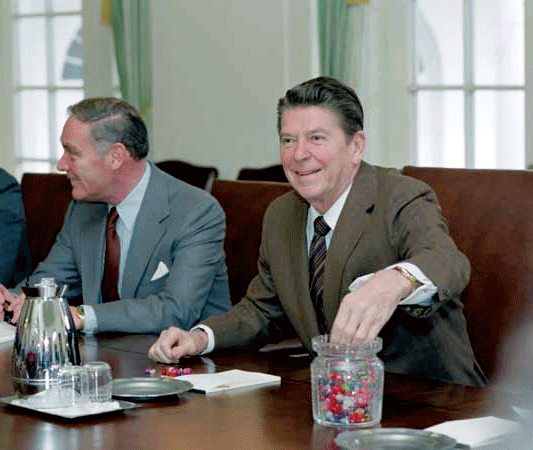Can the Republican Party Return to the Reagan Era?

The current state of the GOP makes many Republicans look back on brighter days of Republican leadership.
With the passing of former First Lady Nancy Reagan on Sunday, the Reagan presidency has entered the spotlight. Reagan presented an optimistic look at conservative politics and policies – and he was successful. Today, conservatism and the Republican Party have been rocked by the hate-fueled, politically incorrect candidacy of Donald J. Trump. Pundits and politicians alike have declared a conservative crisis. In the words of Senator Lindsey Graham, “My party has gone batshit crazy.” Is there any way Reagan Republicanism will return?
Before addressing that question, it’s important to address how the current GOP crisis was created. After the presidencies of Ronald Reagan and George H.W. Bush, the Republicans lost control of the White House to Bill Clinton. However in 1994, just two years after Clinton took office, the GOP, under the leadership of Newt Gingrich, regained control of Congress. For the remainder of his administration, Clinton had to negotiate with a Republican Congress.
Despite this challenge, he was actually pretty successful in terms of passing legislation. He repealed the Glass-Steagall Act, created The North American Free Trade Agreement (NAFTA), emerged from a recession and saw the explosion of the Internet. Many liberals would argue that some of Clinton’s policies were detrimental, citing NAFTA, Glass-Steagall and Don’t Ask, Don’t Tell.
Once the Clintons left office, the Bushes regained the White House under the leadership of George W., the former president’s son. Characterized by two horrific wars in Iraq and Afghanistan, a woefully inadequate and inhumane response to Hurricane Katrina, not to mention a loosening of regulations that contributed to the 2008 financial crisis, the second Bush’s presidency was considered a disaster. As a result, Barack Obama won handedly in 2008, advocating for change.
After two years of a Democratic Congress and president that saw the passing of the Affordable Care Act and the Stimulus Package, the Republican Party, which supported big government under Bush (directly opposed to traditional conservatism’s emphasis on small government) adopted its unifying party message: Stop Barack Obama.
In 2010, powered by the wind of the Tea Party movement, the GOP won a majority of seats in the House, and by 2014 reclaimed the Senate from the Democrats. This period of time was characterized by a fierce opposition party, unwilling to work with the president on several issues like immigration, gun reform and even a military response to the Syrian Civil War. “Stop Obama” was the GOP’s broad message. It attracted a lot of people with many different viewpoints, most notably the electorate that currently supports Trump.
The establishment, from 2010 until now, had promised several things to its supporters: assurances gay marriage would never be approved on a federal level, harsher restrictions on immigration, especially on undocumented immigrants currently within the country and opposition to gun control legislation.
Unfortunately for those voters, none of those promises were fulfilled. The Supreme Court approved same-sex marriage on a national level. President Obama ensured safe havens for various undocumented immigrants, mainly children. And for many gun owners, it seems like a massive federal program to “take our guns away” is imminent, given the high frequency and widespread media coverage of mass shootings.
If the GOP wants to regain its voters, it needs to adopt a unifying message deeper than just “Stop Obama.” It needs to provide a substantive policy platform, outlining what it intends to accomplish in the White House and in Congress, with special considerations to the desires of its base. The essential message would be: small government, deregulation and social change we trust. Then, and only then, will the Republican Party regain its support and have a chance of returning to the Party of Reagan.








